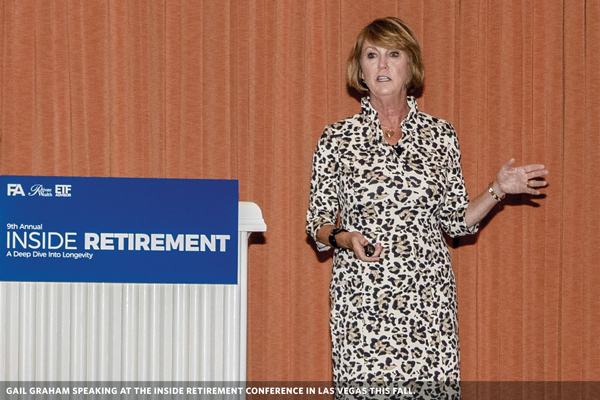
Retirement used to be so easy … at least that’s the popular narrative. You know the romanticized version: retire at 65, get a gold watch and start collecting a pension. Of course, it wasn’t always that easy. But it seems even less easy today given the challenge of self-funded retirement accounts, increased longevity (and the corresponding need to fund a longer retirement) and, for people with health and enough money, many more options for what to do in those post-retirement years.
In that vein, Financial Advisor’s 9th Annual Inside Retirement conference this autumn in Las Vegas aimed to help financial advisors better address the retirement needs of their clients.
During Mitch Anthony’s presentation, the advisor coach, speaker and author argued that the modern concept of retirement is flawed and questioned the value of retiring at all.
“Retirement is a social construct that no longer fits the age we live in,” said Anthony. “It is an artificial finish line imposed upon our lives and based on age, and I can document this: The chief cornerstone of all retirement policy is nothing less than ageism.”
Retirement shouldn’t be the goal for all clients, Anthony noted, and advisors should be more open to discussing and planning for alternatives to formal retirements.
“What do we get people to save for instead of retirement? How about freedom, age-irrespective freedom,” said Anthony. “These are emancipation funds, not retirement funds. Get to the place financially where you can do what you want, with whom you choose, at the pace that’s comfortable to you—that’s a whole lot better than retiring.”
Advisors should help clients find their purpose in retirement, said Anthony, by asking simple, open-ended questions.
“If I were to come up with the simplest retirement conversation possible, it would be something like this: ‘Mr. and Mrs. Client, how are we going to spend your time, and how are we going to pay for that?’” said Anthony. “Which question needs to be answered first? The answer is ‘How are you going to spend your time?’ Spending money is a reflection of how one spends their time.”
The financial services industry has jumped from focusing on all things baby boomer to focusing on millennial investors. But what about the overlooked generation, Gen X? No one has developed a service offering for them, Gail Graham of Graham Strategies told advisors.
The fact is, without a truly robust and distinct Gex X marketing strategy, advisors will have a hard time competing with large “robo” firms for high-net-worth Gen X clients. While Gen Xers aren’t digital natives, they are using technology and self-directed, discount brokers.
While advisors began working with boomers in their 40s and are now reaping the rewards of those relationships, the same is not true of the Gen X generation, age 45 to 55.
Wooing Gen Xers can be tougher than it sounds, Graham said. The cohort tends to be skeptical and pessimistic, based on the financial events that have informed their experience—including the tech and real estate bubbles, Wall Street’s meltdown and the potential demise of Social Security.